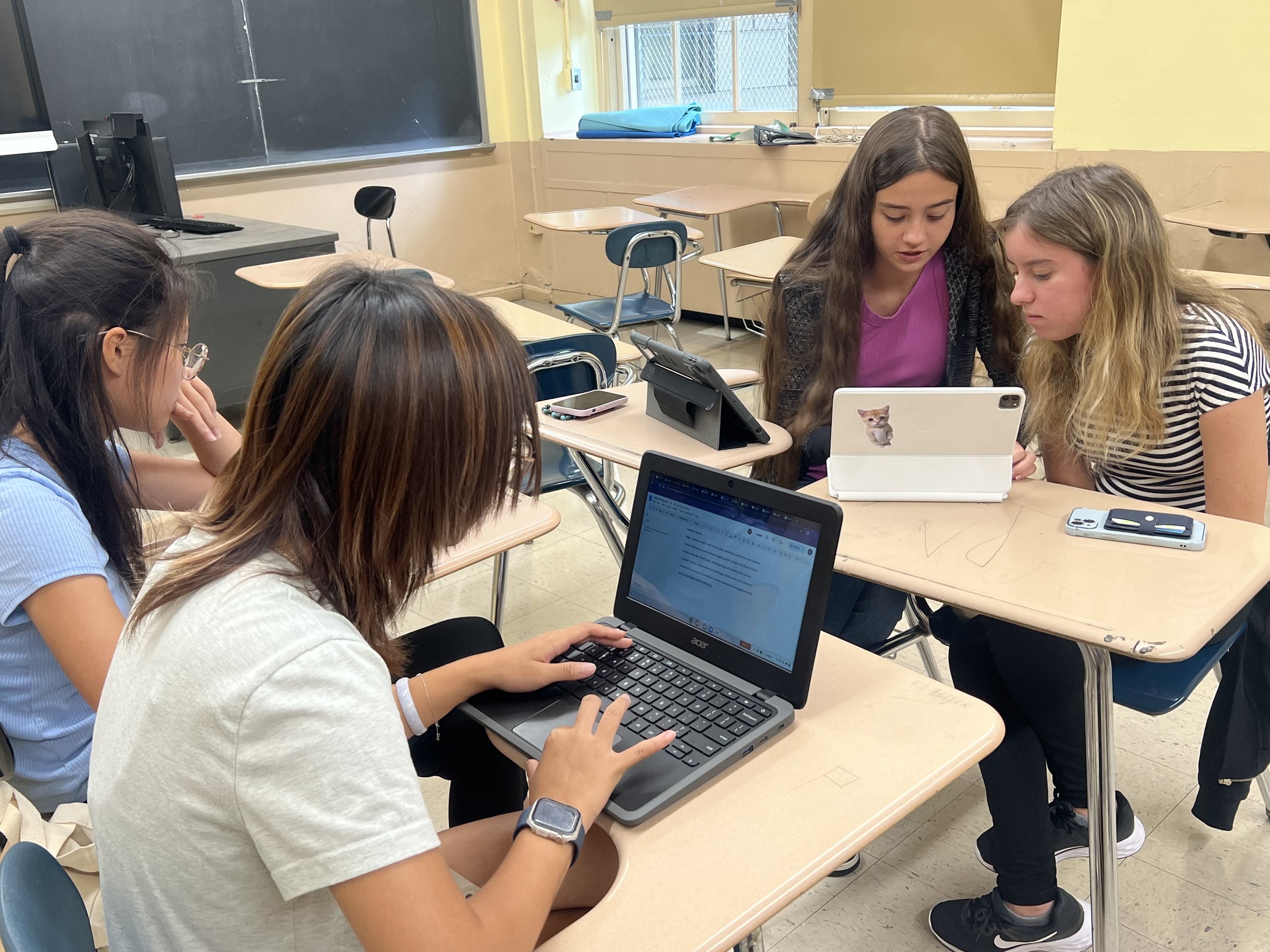'The Most Impactful Moment of My Academic Experience': Debate Team Members Speak Out
The team stages mock debates to prepare for competition. Photo: Olga Rozen
By JOEMI QUIROZ ORTIZ and ANAYA MCLEOD
Under the glow of stadium lights, the chants of cheerleaders, and the roar of supporters, it’s easy to forget that high school competitions don’t always happen on the field or in a gymnasium. While athletes sprint, score, and shoot, another team is quietly perfecting their craft, preparing to compete in a different kind of contest.
The Midwood Debate Team’s victories come without homecoming rallies or marching bands. Yet, the dedication, strategy, and teamwork they exhibit rival that of athletics. For these students, the stakes are just as high: building compelling cases, thinking on their feet, and leaving it all on the metaphorical court.
At the heart of the team is a close-knit community of students. Every Tuesday and Thursday, members gather in Room 345, devoting hours to research, practice rounds, and critique sessions. The team focuses on strengthening each other’s skills and constructing unassailable arguments, ready to pounce on their next opponent.
Advisor Janice Parikh sees the team’s buzzing determination firsthand. “They’re actually surprising me with how much they know and how prepared they are,” said Ms. Parikh. “They’re such a collaborative team.”
This cooperation is crucial, especially with competitions happening every month on rapidly changing topics. "Each student must be ready to argue both for and against the topic,” Ms. Parikh explained. “We want them to be as prepared as possible, no matter which side they end up on."
The team’s hard work paid off at a citywide tournament hosted at Midwood on Saturday, November 16. Students debated the topic “Should the United States substantially reduce their support to Taiwan?” Preparation was intense, with students grinding around the clock to refine their cases, polish their speeches, and practice rebuttals.
Their efforts proved successful, as three Hornets earned awards: seniors Benjamin Weiss and Olga Rozen won second best team, sophomore Paul Khanis won second best speaker, and Weiss won third best speaker.
“It was a home game, so I wanted to make my school and team proud,” Weiss said.
“It was a bit nerve wracking for me because this was my first time competing in varsity,” Rozen said. “But I had a good time and I learned a lot from both my judges and opponents.”
Weiss said, “Nerves can motivate a debater to prepare for a tournament and can keep them alert during a round. I would tell nervous debaters to use a strategy called ‘red-lighting,’” a method of evaluating which events are in your control.
“It helps combat anxiety through rationality,” he said. “We should focus on competing with ourselves more than others.”
Behind each debater, there is a personal reason for their position on the team. “As a child, I was pretty shy and very reserved,” said junior Annabelle Franklin. “Debate has taught me to step out of my comfort zone.” Franklin joined the team as a freshman, eager to sharpen her public speaking skills.
For others, joining the team meant having an opportunity to have their voice heard and to gain insight in unknown fields. “I just had a passion for arguing with others and educating myself on current issues I'm not so aware about,” said Khanis.
The team goes through an intricate process of preparation for about a month before their tournaments. Students work with their partners to develop arguments and possible refutations, and create mock debates.
As a co-captain of the team, Weiss has many responsibilities, such as planning meetings, organizing agendas, and dealing with other issues that arise.
“It definitely does get overwhelming,” he said. “But I have a really great leadership team to support me.”
Alongside Weiss is co-captain Rozen. “Once everyone submits their cases and block files, the other leaders and I review them and give feedback to everyone,” she explained. "We make it a requirement that everyone completes two rounds, and we typically follow that flow before every competition and adjust it based on how much time we have to prepare.”
Even with the team’s impressive work ethic, one of the biggest challenges students face is public speaking skills. "When students aren’t confident in themselves, it can be discouraging,” Ms. Parikh said. “I always remind them that it’s only one round and there’s always room to improve for the next.”
The team continues to find ways to stay motivated. “Even when things are going terrible, we still find a way to make everyone smile with our inside jokes,” said Rozen.
She credits debate with helping her grow. “I think debate has helped me become more confident when speaking,” she said. “It helped me come out of my shell and even improved my participation grades in class.”
“I strongly believe that debate has been the most impactful component of my academic experience,” said Weiss. “It’s taught me to be a better writer, researcher, and thinker, which has helped me inside and outside of the classroom. If it was up to me, every student, starting as young as possible, would participate in debate.”
It’s clear that the Debate Team is more than just a group of students; it’s a community built on trust, hard work, and mutual respect. Their preparation may be intense, but the confidence they’ve built along the way allows them to tackle whatever challenges future tournaments send their way.
Students brainstorm in Room 345 ahead of Nov 16’s city-wide tournament. Photo: Janice Parikh
Two groups of partners review their debate materials. Photo: Olga Rozen



